Do you have a podcast, but are looking to take it to the next level? Interviewing guests for your show can be a great way to find new content and grow your audience. With this guide, we’ll show you how to start a podcast interview, and ask engaging podcast interview questions that lead to a compelling interview.
Since 2009, I’ve conducted over 1000 podcast interviews with a wide range of interesting people from every walk of life: porn stars, bank robbers, drug dealers, billionaires, artists, entrepreneurs, and presidential candidates. From these conversations I’ve distilled 4 essential pillars of a a great podcast interview.
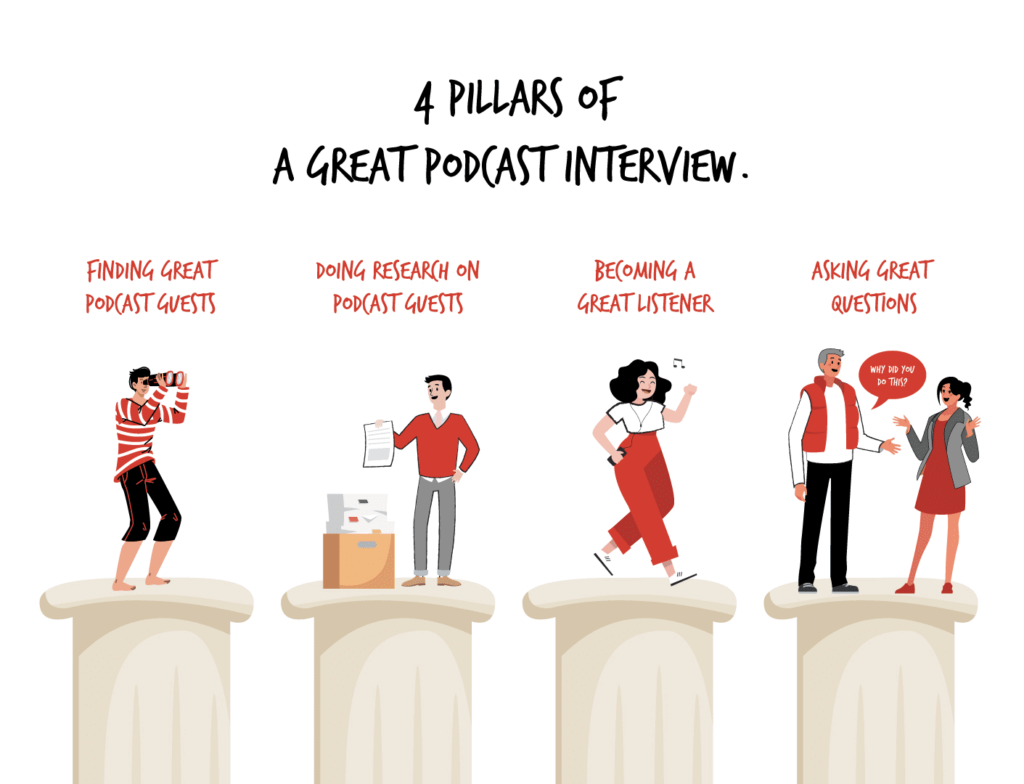
In this guide, we’ll go over the four pillars of a fantastic interview
Finding and inviting guests
Conducting a great podcast interview
Crafting great podcast interview questions
Developing your podcast interview style
Let’s get started.
1. Finding and Inviting Guests
When it comes to conducting a podcast interview, a compelling guest is the most important factor. People will turn you down regardless of how successful your podcast is. Just remember there’s no shortage of insanely interesting people in the world.
The most valuable lesson I’ve learned as a journalist is that everybody is interesting if you ask the right questions. If someone is dull or uninteresting, it’s on you” Kate Murphy, You’re Not Listening
As former podcast guest Nikki Groom says, everybody has a story worth telling and anyone can be a fantastic guest if you ask great questions.
After conducting 1000 podcast interviews with people like Tim Ferriss, Seth Godin, Danielle Laporte, and Ramit Sethi, people still turn me down. Sometimes they even turn me down when they have been on the show before. But I never take this personally.
So how do you find great podcast co hosts and podcast guests?
Personal Interest
I’m always on the lookout for potential guest podcast guests who have interesting stories. If I read about someone in an article, stumble on their work through a google search, or read their book, I’ll add them to my list of ideas for people I want to interview.
For example, I discovered Andrew Yang’s Book, The War on Normal People at Barnes and Noble long before the start of his 2020 presidential campaign. As a result, I was able to land him as a podcast guest.
I also keep an editorial calendar of guest ideas and upcoming guests in Airtable. Unless you capture your ideas for podcast guests you’ll never capitalize on them. Having an editorial calendar has been enabled me to air a new podcast every Monday and Wednesday for 10 years.
Genuine Curiosity
Curiosity is my number one criteria for choosing podcast guests. I don’t care what they have accomplished or how famous they are. Humans connect with stories not resumes.
When I was reading April Rinne’s about page, I came across the following story
While I was in college, both of my parents were killed in a car accident. In an instant, my entire world flipped upside down. I had to grow up fast, and I needed to figure out what really mattered in life: money or meaning, ego or impact, what others thought I should do or what my soul said?
I knew that part of her story would touch listener’s hearts, they would learn something valuable and it was the reason I said yes.
When your curiosity about a podcast guest’s answers is genuine, it’s easier to ask great questions and conduct a great podcast interview.
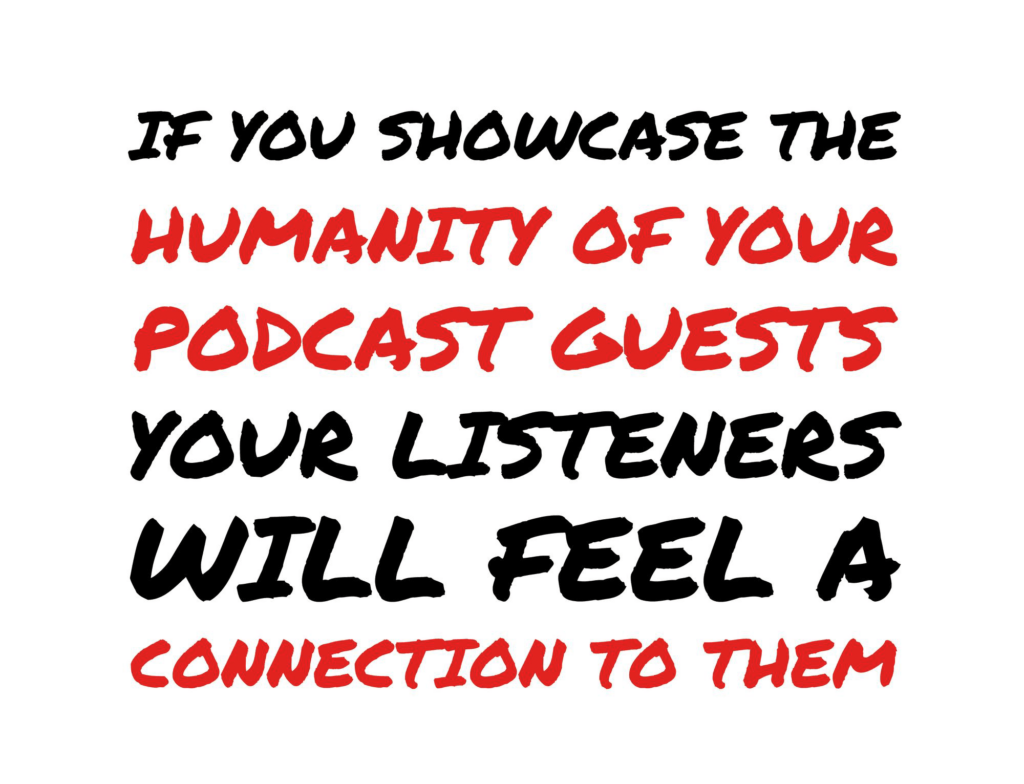
How do Popular Podcasts Get Big Guest and Celebrity Guests?
Even though leveraging your guest’s audience is a frequently cited marketing tactic, conducting interviews with people who are famous is a lousy strategy for creating a successful podcast.
First, celebrity guests have been interviewed a thousand times, appear on all the same shows, and people ask them the same basic questions here. When you interview the same people that have been on every other show, you become a pale imitation of your predecessors. If you want to have a successful interview podcast, you need to stand out in a sea of noise and find people who are interesting.
Second, listeners expand their worldview when they discover someone new.
Being famous doesn’t make someone a compelling guest. Our most popular guests and some of my favorite interviews have been with people nobody has ever heard of.
Some of our weekly guests, and worst guests, have been really well-known internet celebrities. We will never have them back on our show. But if you need to know, the key to getting big guests is to treat every single guest like their story matters because it does.
Don’t Underestimate the Value of Smaller Guests
The first dozen people I ever interviewed were other students in an online course I was taking.
Josh Hanagarne was the first person I ever interviewed. After our conversation, he said “don’t underestimate what this is going to do for you.” I built a career from that one piece of advice.
Sid Savara was encouraged me to focus on interviewing people instead of writing and was my first business partner.
Greg Hartle had a 150 followers on twitter when I interviewed him., Thanks to his mentorship, I planned a conference and grew our business from 600 dollars to six figures in six months.
The least known podcast guests have had the most tangible impact on my life and career. Interviewing famous people might give you bragging rights, But those people aren’t going to have an impact on your life because they aren’t invested in your growth. Never judge the impact a potential podcast guest could have on your life based on their vanity metrics.
Make Your Podcast Audience Your #1 Priority
When I started a podcast, I thought I would interview well-known people, they would share the great interview, with their followers and every episode would go viral. What quickly became apparent was that our listeners, not our guests were the people who caused our show to grow.
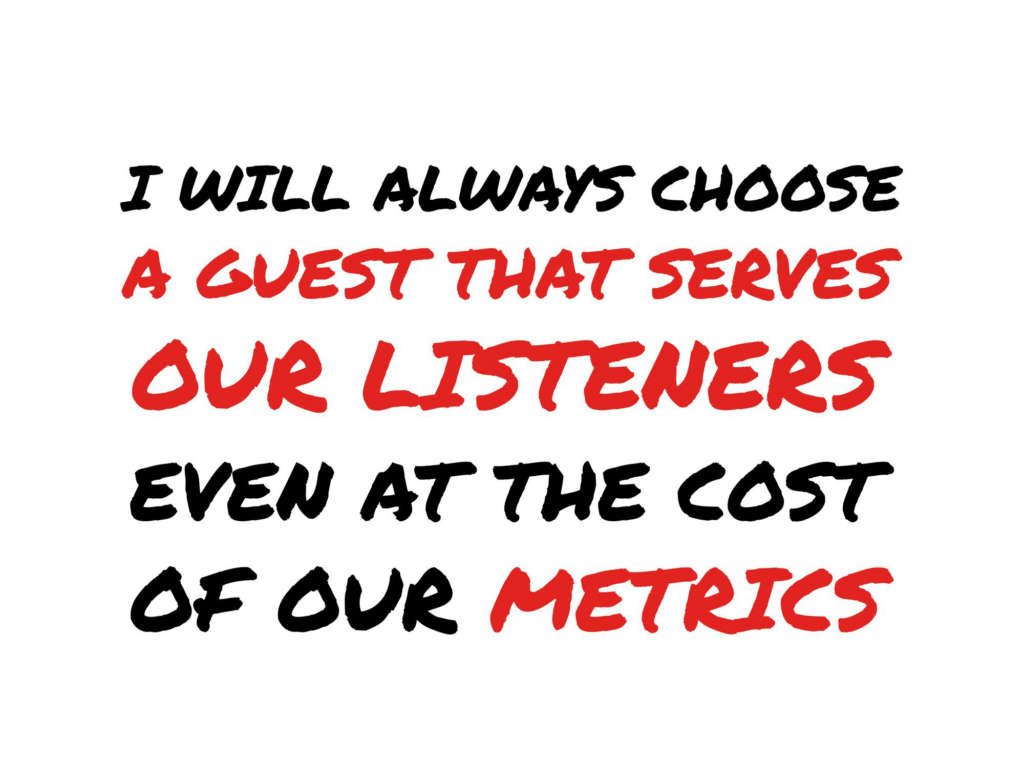
Your job is to create something your listeners want to hear, not to increase your downloads. Being a famous person and interesting are not mutually exclusive. But if you have the choice between someone who is famous or someone who is interesting, choose the latter.
How to reach out and invite guests
There are several methods you can use to reach out and invite guests to your podcast
1.Read Their Books and Email Them
To reach out and invite guests, it is important to appeal to their self-interest. Most potential guests are always looking for opportunities to promote their work, especially if they have a passion project or recently published a book. Express genuine interest in their work and let them know how it has influenced or helped you. This not only shows that you are familiar with their work, but also that you value it, making them more likely to accept your invitation.
2.Ask Your Guests for Referrals
When you start your podcast, the easiest way to find great podcast guests is to ask great guests for referrals. After each interview, ask each guest if they know anyone else who they think would be a good fit for your show.
Asking for referrals creates a compound effect. Eventually, one of your podcast guests will introduce you to someone who is a connector. Once you know a connector, you’ll never have no shortage of potential podcast guests.
For example, my friends Clay Hebert and Sarah Peck have introduced me to dozens of people who have been guests on The Unmistakable Creative Podcast. If I ever run out of ideas for podcast guests, I just send them an email and they send me a list of interesting people to interview.
When you ask for recommendations, the guests have already been vetted by someone who has already been on your show. They are familiar with your format and interview style and know what makes a good guest.
3.Podcast Booking Agencies
While podcast booking agencies can provide a convenient way to find potential guests, they often send out generic pitches that may not resonate with your podcast’s specific theme or target audience. While they can be useful in increasing the number of potential guests, it’s crucial not to depend solely on them. Instead, focus on personal connections, referrals, and genuine interest in potential guests for a more personalized and engaging approach.
Define Your Criteria, Develop Your Standards ,and Create a Rating System
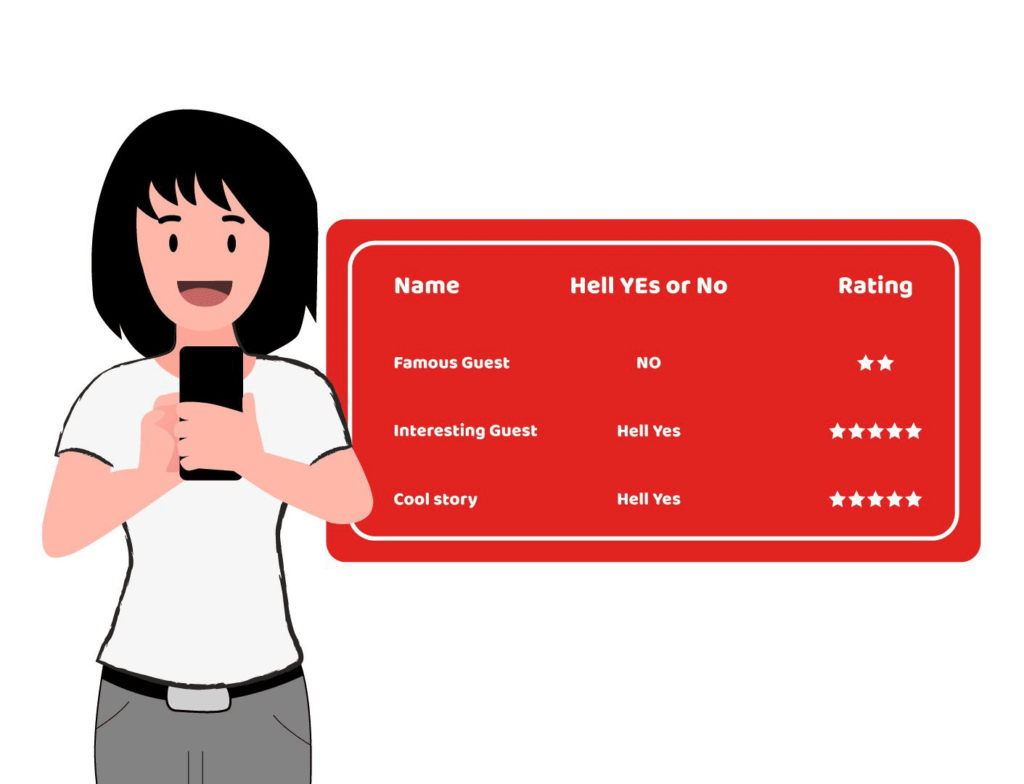
“Make peace with the fact that saying “no” often means trading popularity for respect: When we fight back effectively, it shows people that our time is very valuable. It separates the professional from the amateur.” – Greg Mckeown, Essentialism
To find great podcast guests, you need to define your criteria and develop standards for how you choose guests.
When Greg Mckeown taught a class at Stanford, he assigned each student a numerical rating between 1 and 10. If students received a rating of 7 or less, they were not accepted into the course. The alternative is Derek Sivers’ “hell yes or no” framework for making decisions.
Make Your Standards Ruthless and Non-Negotiable
My roommate jokes that I turn down more people than Harvard, Stanford and Yale combined. The following are my standards for podcast guests.
Every episode is one hour.
We’re interested in stories not soundbites
Our show exists to provide value for our listeners, not to provide publicity for our guests
There are ZERO exceptions to the criteria above. If somebody tries to negotiate, I wish them well. These criteria apply to my literary agent, publisher, and even my close friends. The United States doesn’t negotiate with terrorists and the Unmistakable Creative doesn’t negotiate with podcast guests, book publicists, or anyone else.
It doesn’t matter if the guest is Oprah, Beyonce or the Dalai Lama. I frequently pass on internet celebrities with millions of followers to maintain these standards.
Listeners Will Notice When you Maintain Your Standards
The most important aspect of this show is the list of guests. A who’s who of people you may never have heard of, but who are FAR more interesting than SO many of the “big” guests on so many other shows” – Unmistakable Listener
That response from one of my listeners is worth more than the increase in downloads from a high-profile guest because that’ person could end up being a fan for life. You need to see your listeners as people, not downloads.
2. Conducting the Podcast Interview
Creating the right environment for the interview
Our environment has a profound impact on our behavior, health, happiness, and our ability to listen. Conducting a great podcast interview is a form of what Cal Newport calls Deep Work. You have to eliminate the competition for your attention if you want to be truly present with a podcast guest.
Set Your Computer Up For Listening
“If you need to access websites to perform your work, open only one at a time. Whenever possible, do not use tabs, and when you are done with a website shut it down rather than minimizing or keeping it in your browser. Open but minimized apps and tabs are more accessible than those that are closed even if they appear only trivial so, and thus they facilitate switching” says Adam Gazalley in his book, The Distracted Mind.
When you’re conducting an interview, close open browser tabs, turn off your email, and shut down any other programs running on your computer. This doesn’t just help you listen, it reduces the likelihood of technical issues while you’re recording an interview.
Also, record your phone calls and interviews in full-screen mode, so you can’t see icons on your computer or anything else that might distract you from the conversation. When I’m interviewing someone, I only have two programs open:
RiversideFM to record podcast interviews
Mem.ai to reference book notes during a conversation
Turn Video Off
This is a matter of personal preference. But, if you turn the video off, you actually reduce the visual stimulus that’s competing for your attention. And if you’re not convinced, consider what Kate Murphy says about Terry Gross in her book
Many journalists, including Fresh Air’s Terry Gross, prefer telephone to in-person interviews so they don’t get biased or distracted by the other person’s appearance or nonverbal tics.
Considering Terry Gross is one of the best interviewers in the world, you might want to model her approach.
Leave Your Phone Out of the Room
Studies show that the physical presence of a phone can be a distraction even if it is turned off or in your pocket. It might be tempting to leave your phone in Airplane mode or put it in do not disturb mode. But the impulse to look at your phones is so strong, it’s best to leave it out of the room when you’re conducting a podcast interview.
Declutter Your Desk
“Distractions are pieces of goal-irrelevant information that we either encounter in our external surroundings or generate internally within our own minds,” says Adam Gazalley.
In other words, distractions are not just digital. If you want to become a better listener, limit the items on your desk to whatever you need to conduct the interview.
The only things on my desk when I’m interviewing someone are a water bottle, notebook, coffee, and a pen. Setting up your environment so that it’s distraction-free is the closest thing to a “hack” that will make you a better listener during a podcast interview.
Limit Yourself to One Interview Per Day
Careful listening is draining, regardless of your personality, aptitude, or motivation. – Kate Murphy, You’re Not Listening
If you’re doing it well, listening should push your brain to its cognitive limits because it’s a form of Deep Work. You should feel exhausted after an interview. A pattern I’ve observed in interviews for Unmistakable Creative is that the quality suffers whenever I do more than one interview a day.
Conduct Podcast Interviews at The Time of Day When You’re at Your Best
Another aspect of creating the right environment for conducting better podcast interviews is a time of day. You have to know when you’re at your best if you want to do your best work. For example, I schedule all of my interviews for Unmistakable Creative between 10 am and 12 pm.
First, this gives me time to finish any reading or research prior to the interview.
Second, because I spend the first few hours of my day writing and reading, it primes my brain for questions to ask and topics to explore during the interview.
Anytime, I’ve tried to record an interview after 12pm, it sucks.
Sometimes you’ll have to work around other people’s schedules due to timezones. If that’s the case, respect your guests wishes.
Building Rapport with the Guest
It’s crucial to make your guest feel comfortable and at ease during the interview. This can be achieved by starting with some light, casual conversation before delving into more serious or personal topics. Show genuine interest in their experiences and perspectives, and acknowledge their responses with empathy and understanding. Remember, a comfortable guest is more likely to open up and provide insightful, engaging content for your podcast.
Balancing Between Structure and Spontaneity
While it’s common to prepare a set of questions for a podcast interview, it’s often more beneficial to move away from this practice. Relying heavily on prepared questions can actually hinder your ability to truly listen to your guest and respond organically to their insights. Instead, approach the interview with a sense of curiosity and openness, allowing the conversation to flow naturally. This approach will transform your interview into a genuine conversation rather than a scripted interrogation, providing a far more engaging and enjoyable listening experience for your listeners engaged your audience.
3. Crafting Engaging Interview Questions
Crafting engaging questions for your podcast interviews is an art that requires a balance of curiosity and authenticity. When you’re genuinely curious about your guest’s story, you’ll naturally come up with intriguing questions. Authenticity is equally important – you can’t fake being a good listener. If you’re not truly engaged, your guest will notice.
Vanessa Van Edwards once said, “There are a couple of questions that signal to the other person from a purely brain perspective, this conversation will probably be the same as casual conversations that you had before.” In social situations, these are questions like what do you do, where are you from, etc?
For podcast hosts, the equivalent is how did you get started? To prevent guests from engaging with you on default, you have to ask questions that interrupt a pattern, elicit stories, and appeal to emotion rather than logic.
How to Prepare for a Podcast Interview
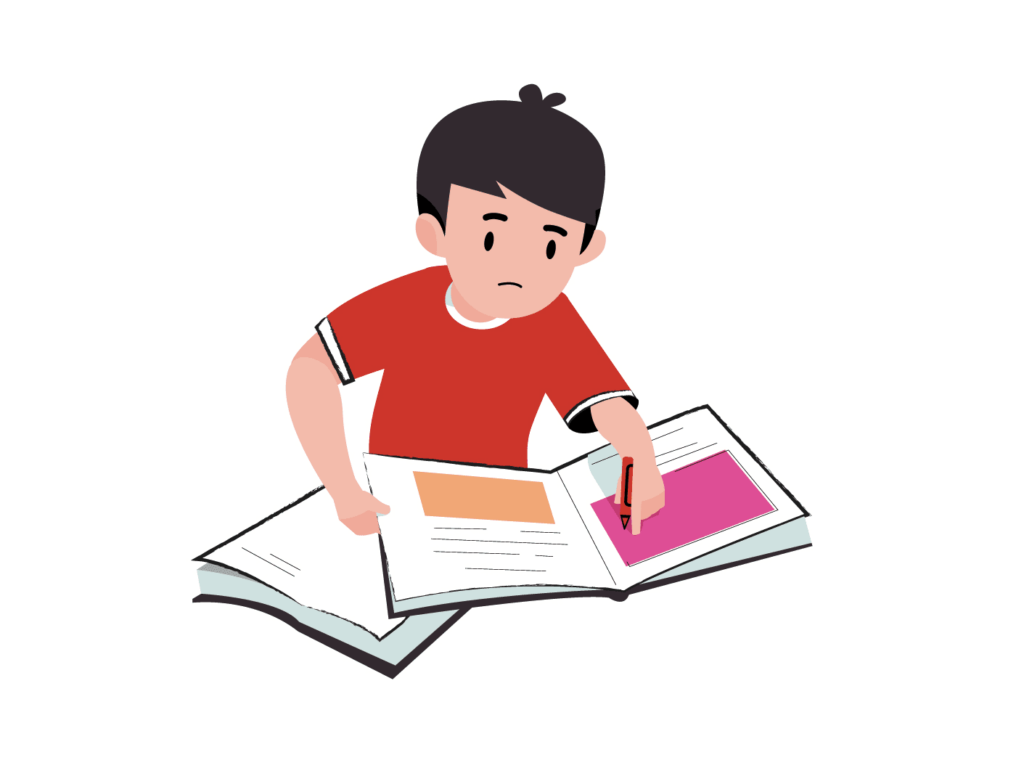
Background research on your guests is a double-edged sword. If you do too much, the conversation will come across a dry. But if you don’t do enough, you won’t be prepared during the actual interview.
Read your guest’s books and take notes
A few years ago, Rob Bell was a guest on The Unmistakable Creative Podcast. When I asked him about his time touring with Oprah, he told me, “She reads the books of every single person she interviews.”
That was enough for me to make that my default rule. When you’re done reading the book, capture your highlights and save them in a note-taking app. For more on how to do this, check out my article on more effective book notes.
Remember that you’re having a conversation, not an interrogation
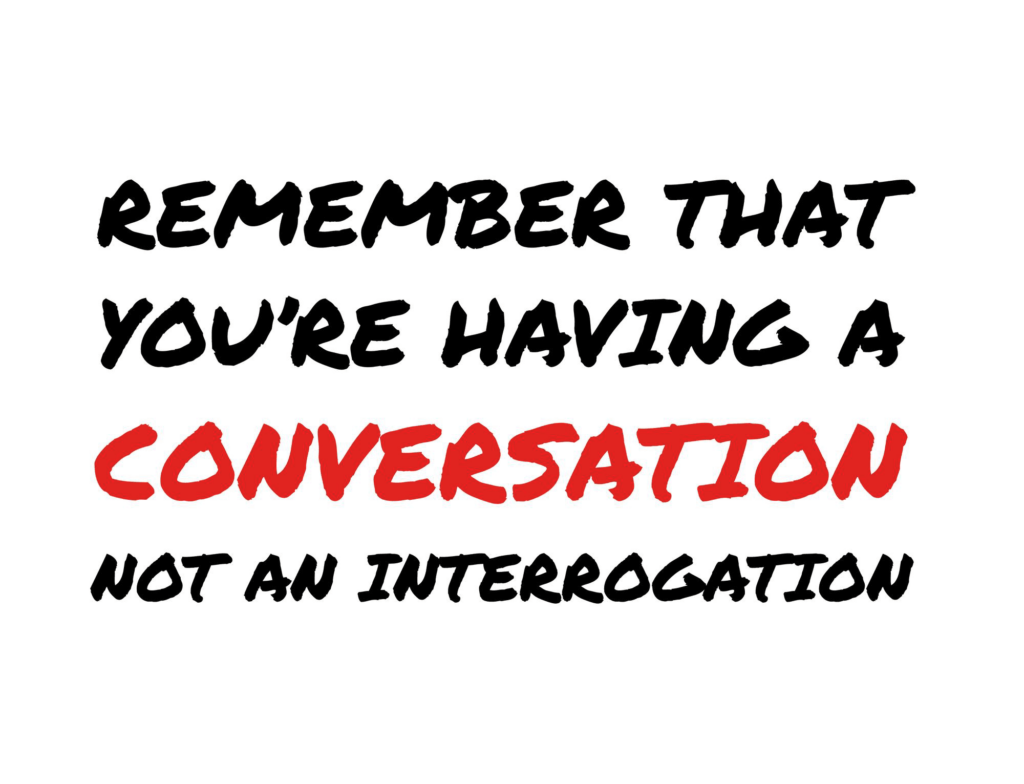
When someone listens to your podcast interview, you want them to feel like they’re eavesdropping on a conversation in a coffee shop. You would never go out with a friend and start a conversation with prepared questions. So you shouldn’t plan or send out potential questions in advance of a podcast interview either.
The Downside of Sending a List of Questions
I’ve done interviews where people have said, here are the questions we’re going to ask. You can say don’t ask me this question because it’s a technical question and I don’t know the answer and I’m not going to do the homework so you’re not going to get a good answer- Tim Harford
In researching for this article, I came across many others who recommend planning questions in advance. That’s lousy advice for conducting a podcast interview.
First, it makes you a worse listener because you’ll already be thinking about your next question.
Second, you won’t be able to adapt if your interviewee throws you off track.
Third, you’ll miss interesting topics because the best parts of a conversation are the ones you don’t expect.
Don’t plan or send questions in advance. If the guests or publicists ask for questions in advance, feel free to send them. But don’t use them.
Dealing with the fear of what to say next
Many people plan their questions in advance because they’re afraid they won’t know what to say next. But “the result is that worrying about what to say next works against you. Your answers will be better, your connections will be stronger, and you’ll feel more comfortable when you have your head free to listen,” says Kate Murphy.
When Cal Fussman Mikhael Gorbachev interviewed, he thought he would have a whole hour. When he got to the former president’s office, he only had 15 minutes. So he ditched his script.
He asked Gorbachev about the most important thing he had learned from his father. This worked in Cal’s favor because the interview ended up lasting an hour. If you ask the right question, you can keep someone talking without breaking a sweat.
Don’t listen to any other interviews they’ve done.
This is somewhat counterintuitive. But I think listening to other interviews that others have done tends to hinder your ability to ask interesting questions that only you could have come up with. Follow your curiosity instead of imitating your role models.
How To Start a Podcast Interview
In a world where people have a million choices and limited attention spans, how you start a podcast interview can determine whether or not someone continues listening.
The Listening Mindset for Conducting a Podcast Interview
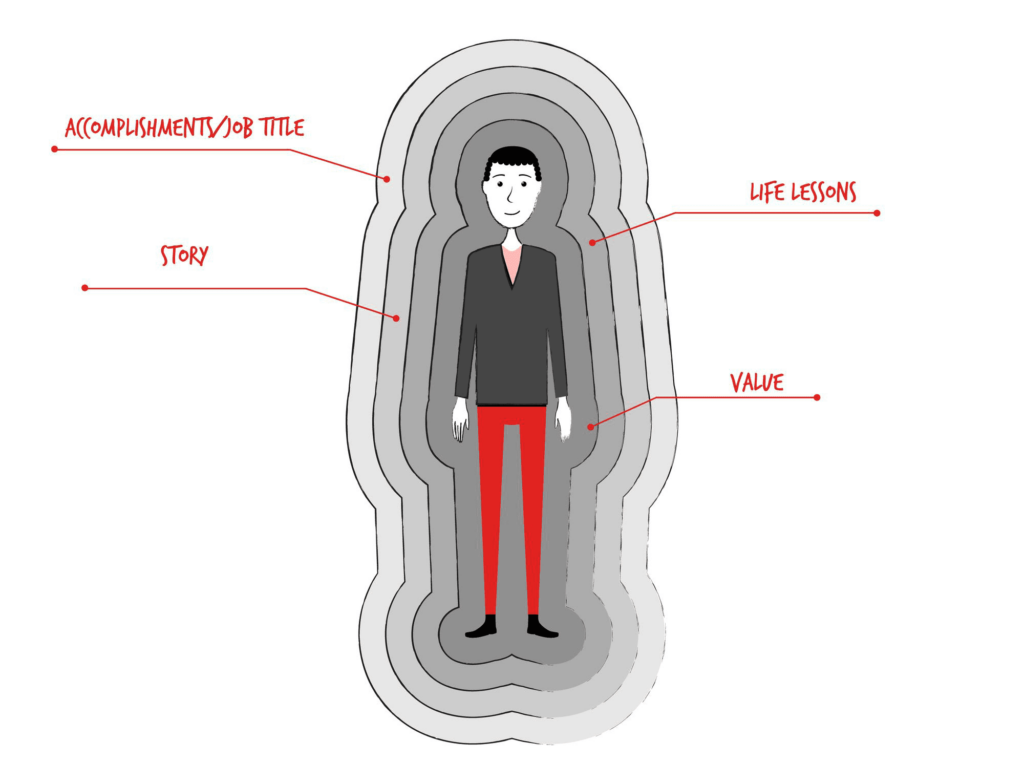
If all you learn by interviewing someone is what you’ve read in their book or from their linked in profile, it defeats the purpose of the interview. It’s no different than having your guest pre-record their answers in advance to the questions they’ve asked a million times.
People are like onions.
As a podcast host, your job is to peel those layers until you get to the core of who they are. That’s what enables you to have unique insight and bring someone’s story to life in a way that connects with your audience.
You want to learn things you couldn’t by reading books, looking at their resumes, or visiting their websites. There’s more to every single podcast guest than they can possibly express through their resumes or their books. Your job is as a podcast host is to get it out of them.
The ability to do this comes down to two traits.
Curiosity: When you’re are genuinely curious about another person’s story, you won’t have trouble coming with questions.
Authenticity: You can’t fake being a good listener. Even if you give the appearance that you’re listening when you’re not, people will be able to tell.
When you learn to listen well, your questions will elicit emotional responses with more in depth too. You’ll get stories instead of soundbites.
1.Avoid Default Questions
“The most important thing that we have remember in the first five minutes of verbal is that you have a choice. You can either decide to engage in interaction on default.”- Vanessa Van Edwards.
When you decide to engage on default, you will end up asking boring questions like “how did you get started, tell me about yourself, etc.” You should ideally ask the types of questions that lead to what NPR calls driveway moments. You want to ask questions that cause your listeners to sit in their driveway just to hear the answer to a guest’s questions.
A few years ago, my old business partner executive producer Brian noticed that the most riveting parts of our guest interviews happen about 20 minutes into the episode. So he suggested, I start the show by asking questions that have nothing to do with their work.
First, they start to open up the minute the conversation starts.
Second, they can’t answer a question without telling a story. Since human beings are hardwired for a story, asking a question that elicits a story will hook your listeners from the start.
Third, they can’t just give you a default answer they’ve given a thousand times.
When you steer clear of default questions, you not only make the interview more engaging for your listeners, but also for your guests.
A clear indication that you’ve asked a great question is when a podcast guest responds with “nobody has ever asked me that before.” This is one of the reasons why starting with unconventional questions like “what social group were you part of in high school” can be so effective – it’s not only a question that most guests have likely never been asked before, but it also helps you and your listeners get to know who they are as a person
2.Ask Questions That Elicit Stories, Not Soundbites
A good story is the currency of a riveting conversation. When your podcast guests tell stories, it piques a listener’s curiosity. For example, when you ask any of three hosts the example questions that I frequently use to start an interview, it’s impossible for the guest not to tell a compelling story:
What did you parents do for work and how did it influence your choices?
What social group were you a part of in high school and what impact did that have on what you do today?
What birth order were you and what did that teach you about navigating life?
These questions might seem unconventional at first glance. However, they are carefully crafted to veer away from the typical, default questions often heard in interviews. By tapping into your guests’ past experiences in a unique and engaging manner, these questions can elicit surprising insights and make the guest appear more interesting to your listeners.
3.Appeal to Emotion Instead of Logic
If you want to ask questions that elicit a story, you have to appeal to emotion, not logic. You want your guests to feel something when they’re telling their personal stories too. Listen to the following excerpt from our show, where Leslie Ehm actually cries during our interview.
4.Humanizing Your Guest and Maintaining Equality
To humanize your guest, focus on who they are instead of what they’ve accomplished. Ask about their worldview, defining moments, and challenges that have shaped them. This requires asking questions that tug at their heartstrings, which you can’t formulate from a simple Google search. Equally important is to avoid putting your guests on a pedestal. Even if you admire your guest’s experience, remember that they are people just like you, with their own problems and challenges. If you elevate them too much, it can hinder your ability to connect with them on a human level.
5.Vulnerability and Boundaries
A great podcast interview is a form of seduction. You need to put your guest at ease and get to know them on a deep and personal level. This encourages them to be more vulnerable and let their guard down. However, it’s crucial to respect their boundaries. If a guest shares something they later wish to retract, honor their request.
6.Listen Beyond Words
Listening goes beyond hearing what people say. Pay attention to how they say it, what they do while they’re saying it, and how it resonates within you. This includes noting your guest’s tone of voice, the emotions they express through their words, and their overall feeling during the interview. This level of listening takes practice but can lead to insightful conversations and a more engaging and insightful conversation.
By following these guidelines, you’ll be able to craft engaging questions that lead to meaningful and captivating podcast interviews.
6.Silence is Golden and Revealing
Some of the most interesting and valuable bits of information have come not from my questioning but from keeping my mouth shut. . – Kate Murphy.
Five seconds of silence during a podcast interview can seem like a lifetime and feel intimidating. As a podcast host, your natural temptation will be to fill dead air.
But as Robert Greene said, “humans by nature abhor a vacuum.” If you embrace the silence and resist the temptation to fill dead air, your guest will do it for you. In many of my interviews, and podcast recordings, guests reveal the most profound insights frequently following a long silence. One way to practice this is by counting to five in your head, before saying something. And often you won’t have to say a word.
7.Listen Beyond Words and Embrace the Journey
Listening goes beyond hearing what people say. Pay attention to how they say it, what they do while they’re saying it, and how it resonates within you. This includes noting your guest’s tone of voice, the emotions they express through their words, and their overall feeling during the interview. This level of listening takes practice but can lead to a more engaging and insightful conversation.
Moreover, remember that a great podcast interview is more like a road trip than a direct flight. You want to travel with a compass, not a map. Be open to taking detours and let your guest guide the conversation. This approach invites your guest to show you places you’ve never been before, enriching the journey for both you and your listeners.
What Surfers Can Teach You About Asking Follow-Up Questions
If you don’t surf, you may not know that surfers ride waves parallel to the beach. And they are constantly adjusting to the wave. Conducting an interview is like riding a wave. You ask a question and listen to your podcast guest’s answer. Then you base follow-up questions on their answer. This forces you to listen closely to what your guest is saying and become fully present with the person you’re interviewing. It makes a conversation sound more organic and natural than it would if you plan questions in advance. The one thing that prevents people from taking this approach is the fear of silence. But they overlook a timeless lesson when they give in to this fear.
By following these guidelines, you’ll be able to craft engaging questions that lead to meaningful and captivating podcast interviews.
4. How to Develop Your Podcast Interview Style
Your interview style will vary from interview podcasts and guest to guest. Some will ask you questions during the interview so you end up talking more than you otherwise would. Others will give you 20-minute answers to your questions.
Steal Like an Artist
To develop your own podcast format and interview style, steal like an artist. I’ve certainly borrowed questions from other podcasts and interviews. For example, Krista Tippett starts every interview with a question about the religious or spiritual beliefs people grew up with.
But don’t just steal from one person. Steal from everyday people, lots of people, mix their ingredients, and develop your own recipes.
Edit Your Own Interviews
One piece of advice I give to new podcasters is to edit their own interviews. I edited the first 400 episodes of Unmistakable Creative myself. Even though this flies in the face of conventional wisdom about running a business, it will do wonders for your ability to conduct a professional podcast or interview.
First, it forced me to listen to each episode three times: once during the interview, once while editing, and again after the episode aired. And it helped me become a much better interviewer
Second, you will come across things you could do better. You’ll notice verbal tics and odd things that disrupt the flow of your interview that you would only notice if you were editing yourself.
Even though I don’t edit my interviews for good interview podcast anymore, I still listen to each one after it airs to hear what I could have done better.
Review your work
When you listen to your interviews, you’ll discover opportunities for questions you wish you’d asked that you can ask in other interviews. You’ll also get a lot of ideas for things you could write about.
Your interview style isn’t something you can figure out at the start. It’s something that emerges every time you conduct a first podcast episode or interview. Pay attention to what your past guests say or those podcast episodes that resonate with your listener. Find out what they have in common and integrate those elements into each of your interviews.
5. Technical Aspects of a Podcast Interview

When I started the Unmistakable Creative Podcast, I used the microphone on my Macbook. A podcast listener liked our show in spite of the sound quality that he sent me a microphone in the mail.
It makes no sense to spend thousands of dollars on fancy tools and professional podcasting equipment if you have little or no podcast audience. Seth Godin once said, “No one ever says, have you heard the sound quality of the last episode of This American life.
I don’t recommend using your computer’s built-in microphone, but there is an important lesson.
High-quality audio won’t automatically enhance your podcast interviewing skills.
Before you spend thousands of dollars building a studio, start a minimum viable podcast and learn how to conduct a great podcast interview. If you lose motivation to continue your podcast, you will save yourself thousands of dollars.
While you don’t need to spend thousands on studio-grade equipment, a microphone that costs less than $100 can significantly improve your podcast’s sound quality.
Additionally, using digital interview tools like Zencastr or Squadcast, which cost less than $20 per month, can help in recording remote interviews and creating separate tracks.
Handling technical issues during an interview can be challenging, but with preparation and patience, these can be navigated smoothly. Always conduct a sound check before starting the interview to ensure your equipment is working correctly.
If a technical problem arises during the interview, stay calm and communicate clearly with your guest about the issue. If necessary, take a short break to resolve the problem before continuing with the interview.
At the end of the day, what still matters most is the quality of the podcast interview.
Wrapping things up, running a podcast with good interview show is really all about striking a balance between being genuinely curious and being authentically you. Say no to those default, run-of-the-mill questions and instead, go for those more thought provoking questions that bring out stories from your guests. This way, you’re sure to have an interesting interview show that’s not just engaging but truly captivating for your listeners. Also, remember to appeal to the heart, not just the head.
Make your guest feel like a fellow human being, not some kind of superior being. And remember, for best interview podcasts it’s okay to have silences – they can actually lead to some pretty profound insights. Listen not just to the words, but to the emotions and the unspoken messages. And of course, while you’re at it, develop your own unique interview style. Sure, the tech stuff like sound quality and all that jazz is important, but at the end of the day, what really makes a podcast interview great is the depth of your questions and the meaningfulness of the conversation. So go ahead, follow these tips, and you’re bound to create podcast interviews that will leave a mark on your listeners.
Originally published on July 22, 2022. This post has been extensively revised to reflect current best practices on podcast interviews.
